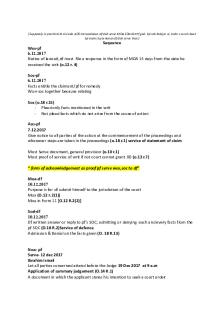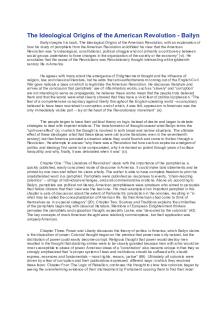F. Causes of the Revolution Primary Documents PDF

| Title | F. Causes of the Revolution Primary Documents |
|---|---|
| Author | Kira Mills |
| Course | US history |
| Institution | High School - USA |
| Pages | 4 |
| File Size | 125.2 KB |
| File Type | |
| Total Downloads | 75 |
| Total Views | 167 |
Summary
notes...
Description
Directions: Read each of the following primary documents and answer IN DETAIL the discussion questions that go along with the documents. You will be responsible for completing each of these before the end of the unit. Go in order. We will assign them as we get to them in class. Declarations of the Stamp Act Congress (1765) pp. 101-102 in “Documents to Accompany” 1. Does it appear that the members of the Stamp Act Congress are determined to demonstrate that they are not rebels but loyal British subjects? Why or why not? Yes because they are asking for their rights they think they derserve as British subjects 2. According to the Congress, what basic constitutional rights do the colonists have? Same rights as Englishmen 3. In what ways does the Congress emphasize pragmatic as well as philosophical arguments against British imperial reforms? They should have representation in Parliament 4. How convincing is the case the Stamp Act Congress makes against the Stamp Act? Explain. The case is decently convincing because they state it in a formal way that shows their points Letter VII from a Farmer (1768) pp. 103-105 in “Documents to Accompany” 1. Would Dickinson agree with those who stated that British politicians were sincerely concerned about the needs and concerns of the colonists? Why or why not? He would not agree with those people, he is convinced that the politicians that they set this tax as a precedent for future purposes 2. According to Dickinson, why did colonists have to refuse to pay the small Townshend duties? Because it is going to be a precedent for future taxes which would likely be larger and is founded on the destruction of constitutional security 3. Would you describe Dickinson’s argument as an emotional appeal or a pragmatic appeal? Why? I think that his repeal is emotional simply because it slightly theoretical making it not a pragmatic appeal An Account of the Boston Massacre (1770) pp. 108-109 in “Documents to Accompany” 1. According to Captain Preston, did the Bostonians have legitimate reasons for being unhappy about the fact that British troops were stationed in their city? No because the troops were there to defend them 2. Judging from Preston’s account, does the term Boston Massacre seem accurate? Why or why not? No because there weren’t that many deaths and he didn’t give the orders to fire and repremanded the soldiers 3. Since Preston would naturally be inclined to present his actions and the actions of his men in the best light, how believable is his account of what happened? Not very because he painted himself in the best light possible and made it seem like absolutely none of it was his fault
Extension Activity Read at least two other accounts (besides Preston’s) of what happened on March 5, 1770. Several accounts can be found at this link: 1. Did the accounts you read match up with Captain Preston’s recollection? What were the similarities and differences? Similar- most of the witnesses for the king say that the captain didn’t give the order to fire Different- exact details of the accident vary 2. Considering all accounts, what is your best guess as to what happened on March 5, 1770? Who is to blame for the “Boston Massacre”? Someone fired on accident and it led to mass confusion fuled by the behavior of the colonists “The Bloody Massacre Perpetrated in King Street,” by Paul Revere, 1770 See Revere’s engraving by clicking on the link above: 1. Why has this image been referred to frequently as a work of propaganda? It’s not an accurate depiction of the event, and was used to fuel the argument against the Brits 2. Make a list of discrepancies between what actually happened that day and Revere’s engraving. Doesn’t always depict Crispus Attucks as black, soldiers weren’t actually lined up and given order to fire, shows laborer colonists as gentlemen, the weather doesn’t match An Account of the Boston Tea Party of 1773 pp. 110-112 in “Documents to Accompany” 1. How thorough was the planning for the Boston Tea Party? It seems like there wasn’t a whole lot known other than to show up dresses as indians, but the three men who were in charge seemed to have a decent plan from Sam Adams 2. Were the participants eager to have their names known? Why or why not? No because then someone could turn you in, not knowing anyone makes you risk the consequences for only yourself 3. What, if any, specific rights does Hewes claim that he was trying to support by participating in the Boston Tea Party? They had originally met to discuss preventing the tea from landing
A British View of Rebellion in Boston (1774) A. “The Bostonians Paying the Excise Man” B. “Bostonians in Distress” Pp. 112-113 in “Documents to Accompany” 1. How do the actions depicted in the background of each print indicate the escalation of the crisis? What is the significance of depicting Malcolm as being forced to drink tea?
The significance is linking it to the Boston Tea Party since the colonists are forcing him to drink tea, the actions in the background of The Bostonians in Distress is showing how the other colonies tried to help Massachusetts, and in 2. What is the significance of the “Liberty Tree” in these prints? How is it being mocked? What role did the so-called Liberty Tree play during the Stamp Act Crisis (Google it if you are not sure)? The Liberty Tree is where Bostonians hung effigies of stamp distributors, which is significant since they are threatening to hang Malcolm, where as in The Bostonians in Distress, the colonists are in a cage hanging from the tree. In The Bostonian’s Paying the Excise-man, or Tarring & Feathering, the backgroud shows all of the events from the daylong assult on Malcolm 3. How might British and American audiences interpret these images differently? What opposing lessons might they have drawn from them? The Bostonians would disagree with The Bostonian’s Paying the Excise-man, or Tarring & Feathering, and the British would disagree with The Bostonians in Distress. Lord Dunmore’s Proclamation (1775) Pp. 121-122 in “Documents to Accompany” 1. How does Lord Dunmore instruct the crown’s loyal subjects to behave? What does he request they do? To only pay their taxees to authorized British, to join the fight on the side of the king 2. Do you think that Lord Dunmore’s move to free the slaves of the “Rebels” convinced many of Virginia’s rebellious gentry to switch sides and support the crown? How do you think that Virginia’s gentry reacted to Dunmore’s edict on the status of their slaves? No, it just gave them more reason to rebel, the gentry would be upset that the Brits would take their slaves 3. Looking at this document, do you see any reason why a slave might find Dunmore’s offer suspect? Yes, because he says that he was given authority was a king but British have slaves as well Condemning the King on the Issue of Slavery (1776) Pp. 125-126 in “Documents to Accompany” 1. Comparing this section with the pronouncement in the Declaration of Independence that “all men are created equal,” is it accurate to say that as Jefferson uses it, the term men stands for both men and women? Yes because it is in a different context 2. Is Jefferson saying that slavery is wrong or just that the slave trade is wrong? Explain. He is saying that slavery is wrong because it violates rights of life and liberty 3. Must the colonists share the blame for allowing the evils Jefferson denounces? Why or why not? Yes because they are buying the slaves 4. Had this passage been included in the Declaration of Independence, how might the course of U.S. history been changed? The civil rights movement would have been earlier, and may have prevented a lot of segregation Thomas Paine’s “Common Sense” (1776) 1. Why do you think Paine began his argument for independence with an attack on the principle of monarchy and hereditary succession? Because the monarchy and hereditary success is a very unamerican ideal and they don’t want that type of
government because it has led to a lot of corruption and dissconnect between the common people and the government 2. Explain Paine’s analogy to parents. According to him, who are the real “parents” of America? Europe because America is an asylum for persecuted people from all over Europe, colonies are more diverse than Britain 3. What geographical arguments does Paine make? The Britain involves them in too many wars and is too far away to always help, small islands can’t protect themselves, and the satellite shouldn’t be larger than the primary planet, but America is larger than Britian 4. What passages illustrate Paine’s effort to write in language ordinary readers can understand? Passage 10...
Similar Free PDFs

Causes of Chinese revolution
- 3 Pages

Causes of Revolution
- 3 Pages

The Root Causes of Crime
- 7 Pages

Effects of the Sugar REvolution
- 4 Pages

Causes of the South African War
- 4 Pages

Causes of WWII - Philosophy
- 2 Pages

Types of documents
- 2 Pages
Popular Institutions
- Tinajero National High School - Annex
- Politeknik Caltex Riau
- Yokohama City University
- SGT University
- University of Al-Qadisiyah
- Divine Word College of Vigan
- Techniek College Rotterdam
- Universidade de Santiago
- Universiti Teknologi MARA Cawangan Johor Kampus Pasir Gudang
- Poltekkes Kemenkes Yogyakarta
- Baguio City National High School
- Colegio san marcos
- preparatoria uno
- Centro de Bachillerato Tecnológico Industrial y de Servicios No. 107
- Dalian Maritime University
- Quang Trung Secondary School
- Colegio Tecnológico en Informática
- Corporación Regional de Educación Superior
- Grupo CEDVA
- Dar Al Uloom University
- Centro de Estudios Preuniversitarios de la Universidad Nacional de Ingeniería
- 上智大学
- Aakash International School, Nuna Majara
- San Felipe Neri Catholic School
- Kang Chiao International School - New Taipei City
- Misamis Occidental National High School
- Institución Educativa Escuela Normal Juan Ladrilleros
- Kolehiyo ng Pantukan
- Batanes State College
- Instituto Continental
- Sekolah Menengah Kejuruan Kesehatan Kaltara (Tarakan)
- Colegio de La Inmaculada Concepcion - Cebu








